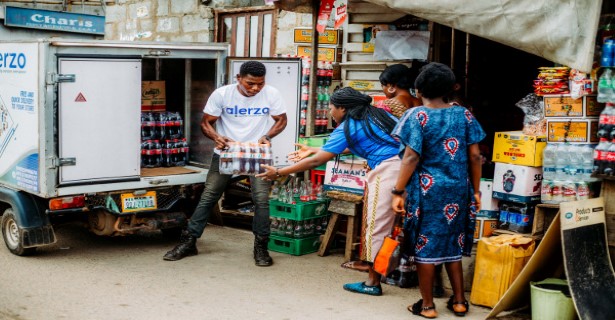E-Business
How B2B E-commerce Platforms Digitization Aid Nigerian Businesses

The sale of goods or services between businesses, utilizing any of the various online or electronic channels, referred to as B2B e-commerce, is on a steady rise in Nigeria.

This rise, both in volume of transactions and number of operators, is prompted by the success recorded by the B2C e-commerce operations, especially during the covid-19 quarter in-place (lockdown) period.
Just as in the B2C, the B2B e-commerce hinges its operations on digital processes to deliver on its promises to the other players in the e-commerce value chain.
The B2B e-commerce platforms deploy digital solutions in its operations to streamline their processes in order to achieve improved efficiency as well as an improved business experiences for the retailers, wholesalers, manufacturers and distributors on their platforms.
While all platforms develop their digital solutions in their operations according to their needs and capabilities, B2B e-commerce players like Alerzo have distinguished themselves as leaders in the digitalization arena.
Their digitization process, relying on superior data quality – collection and structuring – has enabled them achieve a level of automation in their operations in Nigeria. For instance, retailers on Alerzo’s platform can order products via the internet, short messaging service (SMS), voice and WhatsApp and have such products deliver them to their stores in less than four hours.
Additionally, Alerzo’s digital app, Alerzoshop, allows the retailers on its platform to buy their products at cheaper rates, enjoy huge discounts and have their orders delivered to them at no extra cost.
The app has taken the Nigerian retailer to a whole new world of opportunities with a lifeline of numerous mouth-watering incentives. It also helps these retailers in inventory management, guaranteed product quality and time savings.
B2B e-commerce players also boost the profitability of retailers. One of the ways they do this is by taking the burden of logistics off the retailers on their platform. While retailers who are not on the platform pay the logistics costs of hiring a ‘carrier’, paying market exit fees, and getting public transport to carry their goods to their stores, Alerzo for example delivers the orders to the informal retailers on its platform at no cost.
Also, the company recently launched the Alerzopay – its cashless payment and lending platform – to provide informal retailers with working capital to keep their stores running and to drive financial inclusion. Additionally, the company advances POS terminals that run on the Alerzopay platform at no cost to interested retailers who want to act as agents.
Digitization of customer data such as order history and order status can substantially increase the customer’s satisfaction. Through digitization of orders, the B2B e-commerce platforms have made it possible to keep the customer in the know as to when his or her order will arrive.
Alerzo and its peers have gone along to digitize products information, customer order, stock to generate new insights for the manufacturers, distributors, wholesalers and their businesses. Such in-depth analysis of data can unlock a huge potential for businesses that make use of them. These digital products also help manufacturers and distributors get feedback on consumer perception, product preferences etc.
Alerzo and other frontline B2B e-commerce platforms are also empowering manufacturers, distributors and retailers by digitising the value chain and enabling efficient factory-to-retail distribution for food and consumer goods companies. They facilitate faster and quicker inventory movement for FMCG companies to help bridge possible disruptions in the supply chain.
The rise of B2B e-commerce in Nigeria is going to gather momentum in the coming years, given the ease that comes with increased digitization of operations of the platforms as well as the increasing number of other players – manufacturers, wholesalers, distributors and retailers – that are coming on board the sector.
E-Business
Kaspersky Discovers New Phishing Campaign Exploiting Google Tasks Notifications to Steal Corporate Credentials

Kaspersky has uncovered a new phishing scheme that abuses legitimate Google Tasks notifications to trick corporate users into revealing corporate login credentials.

By leveraging Google’s trusted @google.com email domain and notification system, attackers bypass traditional email security filters and exploit users’ trust in familiar services.
In this campaign, victims receive an authentic-looking notification from Google Tasks with the subject line “You have a new task.” The message creates the illusion that the recipient’s company has adopted Google’s task management tool, pressuring them to act quickly. The notification often includes elements of urgency, such as a high-priority flag and a tight deadline, to prompt the victim’s immediate response.
Upon clicking the embedded link, users are directed to a fraudulent form disguised as an “employee verification” page, where they are asked to enter their corporate credentials under the pretense of confirming their status. These stolen credentials can then be used for unauthorised access to company systems, data theft, or further attacks.
“Google’s vast ecosystem of services gets exploited by scammers. The scheme with Google Tasks is part of a broader trend observed before and continuing into 2026, where cybercriminals misuse legitimate platforms to distribute scams and phishing.
Notifications originating from legitimate domains naturally evade many spam and phishing filters, while the social engineering aspect – making it seem like an internal company process – lowers the victim’s guard,” comments Roman Dedenok, Anti-Spam Expert at Kaspersky.
E-Business
esentry 2025 Report Shows Healthcare, Financial Services and Telecoms as Staging Grounds for Increased Cyberattacks in Africa

Cyber adversaries targeting African organisations are increasingly shifting away from opportunistic attacks toward deliberate, sector-specific campaigns aimed at the continent’s most critical digital infrastructures, according to the esentry 2025 Annual Report released by esentry, Lagos-based Africa’s leading indigenous Managed Security Service Provider (MSSP).

The report identifies healthcare, financial services, and telecommunications as the primary staging grounds for high-velocity cyberattacks, reflecting a growing focus on sectors that underpin economic stability, public welfare, and digital connectivity across Africa.
The findings are drawn from one of the largest cybersecurity datasets analysed in the region. Over the course of 2025, esentry processed more than 31 billion security events, generating 3.5 million alerts and successfully blocking over 15,000 malicious attempts. This monitoring scale shows that, while traditional financial institutions remain a core target, the threat landscape has expanded to include digital lending platforms, healthcare systems that store sensitive personal data, and telecom operators responsible for national and regional connectivity.
Within the healthcare sector, the report highlights ransomware as the most acute risk, with attackers frequently exploiting exposed Remote Desktop Protocol (RDP) services to compromise patient data and disrupt essential medical operations. In financial services, organisations are facing a surge in credential abuse, insider-related threats, and info-stealer malware designed to enable fraud and unauthorised access. Telecommunications providers are increasingly targeted by highly tailored phishing campaigns and attacks on exposed web services, which aim to harvest credentials and compromise customer data.
Commenting on the findings, Gbolabo Awelewa, Chief Business Officer at esentry, said the nature of cyber threats across Africa has evolved significantly. “The threats we are seeing today are deliberate, informed, and carefully tailored to local enterprises. Attackers are exploiting trusted access and moving quietly within networks, which makes early detection critical. Our coordinated cybersecurity model, spanning Defence, Intelligence, Offence, and Security Engineering, allows us to combine scale, speed, and deep contextual insight to detect and neutralise threats before they escalate,” Awelewa said.
A defining trend identified in the report is the shift from overt system exploitation to the abuse of legitimate access. By leveraging compromised credentials and ‘living-off-the-land’ techniques, attackers can blend into routine enterprise operations and significantly delay detection. This approach has compressed the attack lifecycle, enabling adversaries to move from initial access to full operational impact in fewer than 15 days.
To counter this acceleration, the report emphasises the importance of early detection and automated response. esentry says it currently contains low-complexity incidents in under 90 seconds, using a combination of structured threat hunting and centralised telemetry to anticipate and absorb attacker pressure rather than reacting after damage has occurred.
As African organisations continue to digitise, the esentry 2025 Annual Report positions itself as a critical reference point for understanding the continent’s evolving cyber threat environment. The report concludes that protecting Africa’s digital trust will require a shift away from fragmented security tools toward disciplined, coordinated defence frameworks, what esentry describes as a unified Phalanx formation.
E-Business
AfDB, UNDP Launch $10Bn AI Initiative for Africa

The African Development Bank Group (AfDB) and the United Nations Development Programme (UNDP) have launched an ambitious $10 billion project to support the adoption of Artificial Intelligence (AI) across the continent.

The 10 Billion Initiative intends to accelerate ethical AI adoption and inclusive digital economic growth in Africa.
The initiative follows the Nairobi AI Forum, which took place earlier this month in Kenya and brought together governments, private sector leaders, development partners, and tech innovators to define pathways for impactful AI adoption.
According to the organisations, the strategy is a co-designed collaboration between the Bank Group, UNDP, and commercial partners that aims to raise up to $10 billion by 2035.
The resources will be used to create up to 40 million new jobs across the continent by 2035, through targeted investments that provide the groundwork for AI and accelerate widespread adoption in everything from entrepreneurship and regional data infrastructure to policy frameworks and skill development.
Nicholas Williams, AfDB Group ICT operations division manager, commented: “As a leading multilateral development institution, the bank is leveraging its comparative advantage to ensure Africa is not left behind in the AI era.
“The AI 10 Billion Initiative paves the way for expanded partnerships and sustained investments that will accelerate AI entrepreneurship, strengthen data and infrastructure ecosystems, and support inclusive growth across the continent.”

 General News2 days ago
General News2 days agoKPMG Strengthens Africa Leadership to Support Long‑term Growth Across the Continent

 E-Business2 days ago
E-Business2 days agoesentry 2025 Report Shows Healthcare, Financial Services and Telecoms as Staging Grounds for Increased Cyberattacks in Africa

 News1 day ago
News1 day agoNITDA Equips Federal Character Commission with Data Tools to Drive Public Sector Reform

 E-Financial2 days ago
E-Financial2 days agoFlutterwave Rises from Lagos Startup to Africa’s Fintech Powerhouse

 News2 days ago
News2 days agoNigeria, EU Ink Research, Innovation Deal Worth €100Bn

 E-Financial1 day ago
E-Financial1 day agoHistory is Watching: Tinubu’s Moment to Rescue Nigeria’s Stolen Future

 Telecom1 day ago
Telecom1 day agoTelecom Giant MTN Injects N1.0 Trillion CAPEX into Network Expansion

 General News2 days ago
General News2 days agoPalmPay Couples Show How Love Is Funded Digitally























